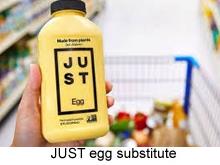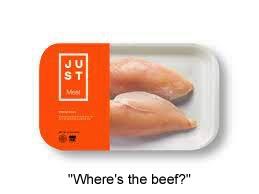 Advances in cell-cultured meat technology have been documented in both scientific papers and the financial press over the past two decades. Concurrently the food industry and venture capitalists have witnessed a sequence of self-promotions by Josh Tetrick, creating substitutes for eggs and more recently a claimed entry into cell-cultured meat. At the launch of egg-free mayonnaise, Tetrick claimed that his product, that was effectively off-the-shelf and recipe book- available would render the entire egg industry obsolete. His early business endeavors were marked by controversy, questionable business practices, frequent self-congratulatory press releases and interviews in vegan-oriented magazines and websites stressed the aspect of welfare. Since the early 2000's, Tetrick and his companies in various iterations have made little impact on the number of hens nor has he replaced either shell eggs or real egg liquid. His early endeavors did however reputedly raise over $100 million in venture capital with little to show for it.
Advances in cell-cultured meat technology have been documented in both scientific papers and the financial press over the past two decades. Concurrently the food industry and venture capitalists have witnessed a sequence of self-promotions by Josh Tetrick, creating substitutes for eggs and more recently a claimed entry into cell-cultured meat. At the launch of egg-free mayonnaise, Tetrick claimed that his product, that was effectively off-the-shelf and recipe book- available would render the entire egg industry obsolete. His early business endeavors were marked by controversy, questionable business practices, frequent self-congratulatory press releases and interviews in vegan-oriented magazines and websites stressed the aspect of welfare. Since the early 2000's, Tetrick and his companies in various iterations have made little impact on the number of hens nor has he replaced either shell eggs or real egg liquid. His early endeavors did however reputedly raise over $100 million in venture capital with little to show for it.
 Moving on to new ventures, Tetrick established the Good Meat Division of his Eat Just enterprise and has raised a claimed $300 million to establish production units. Currently his business interests appear to be centered in Singapore that approved cell-cultured meat for sale. With this development, Tetrick has changed his emphasis from welfare to sustainability, but the grandiose sentiments to replace all red meat persist. His activities purport to parallel earlier and far more substantial and credible entrants into the field of laboratory-cultured meat. It is estimated that over $2 billion has been invested in cell-cultured enterprises with the leading companies Future Meat Technologies, Aleph Farms and Supermeats of Israel; Upside Foods (previously Memphis Meats), Matrix Meats and Blue Nala of the U.S. and Mosa Meats of the Netherlands. These enterprises have a number of characteristics in common:-
Moving on to new ventures, Tetrick established the Good Meat Division of his Eat Just enterprise and has raised a claimed $300 million to establish production units. Currently his business interests appear to be centered in Singapore that approved cell-cultured meat for sale. With this development, Tetrick has changed his emphasis from welfare to sustainability, but the grandiose sentiments to replace all red meat persist. His activities purport to parallel earlier and far more substantial and credible entrants into the field of laboratory-cultured meat. It is estimated that over $2 billion has been invested in cell-cultured enterprises with the leading companies Future Meat Technologies, Aleph Farms and Supermeats of Israel; Upside Foods (previously Memphis Meats), Matrix Meats and Blue Nala of the U.S. and Mosa Meats of the Netherlands. These enterprises have a number of characteristics in common:-
- They were established by scientists with specific experience in cell-culture technology, generally with an affiliation to a university or technological institute.
- Companies that have initiated pilot production have frequently received public sector support regarded as an endorsement of proof of concept
- Established companies in the field have made steady progress moving from laboratory scale through to pilot plants with plans to expand into commercial production
- Only a few companies have successfully developed growth media required to sustain the proliferation of cells in biological reactors
- The leading contenders for future commercial production have affiliations with existing red-meat producers or have received funding from established food companies and reputable venture capital investors. This presumes evaluation of concepts and progress by experienced and competent food scientists, marketing specialists and financial analysts.
- Companies in the field are conservative in their projections and pronouncements consistent with acceptable practice in an emerging industry without established government standards and regulation.
- Established companies have provided tours of their facilities to experts in food technology and have provided images of laboratories, pilot plants and designs of projected commercial facilities, designating equipment and identifying teams of competent and qualified R&D, QA and production personnel
- The functional companies are withholding projections of sales based on the current wide disparity between projected production costs using existing technology and prevailing prices of red meat and chicken.
- All companies acknowledge that regulatory approval both in the E.U. and the U.S. will be necessary for wide-scale acceptance of cell-cultured meat.
- Observers monitoring progress in the field have yet to be convinced that even with comparative costs, that consumers will shift their preference from conventional meat based on intangibles such as welfare, sustainability and environmental considerations.
And now we come to the Eat Just Good Meat Division- - -
 It is time for Josh Tetrick to conform to the conventions of the developing industry. He must disclose the names of his scientists and their affiliations who have and are contributing to his apparent come-from-nothing emergence into the field. Cell-culture on a pilot-scale volume is not achieved by cooks in a kitchen. He will have to provide broad details of his technology and equipment that he intends to apply to progress from pilot study to commercialization. He claims to be serving cell-cultured meat in Singapore. Where is it produced? In what quantities? Is the product a composite of real and cultured product and if so their relative proportions? To receive more than the alleged support of obscure venture capital investors and sovereign funds of Middle East nations, reputable food scientists must provide positive comments on his progress and achievements relative to competitors. Marketing and financial experts should be able to comment on his projected pricing and production capacity and his marketing strategy.
It is time for Josh Tetrick to conform to the conventions of the developing industry. He must disclose the names of his scientists and their affiliations who have and are contributing to his apparent come-from-nothing emergence into the field. Cell-culture on a pilot-scale volume is not achieved by cooks in a kitchen. He will have to provide broad details of his technology and equipment that he intends to apply to progress from pilot study to commercialization. He claims to be serving cell-cultured meat in Singapore. Where is it produced? In what quantities? Is the product a composite of real and cultured product and if so their relative proportions? To receive more than the alleged support of obscure venture capital investors and sovereign funds of Middle East nations, reputable food scientists must provide positive comments on his progress and achievements relative to competitors. Marketing and financial experts should be able to comment on his projected pricing and production capacity and his marketing strategy.
The hallmarks of a fraud as we know from the finger-prick house of cards, and other less prominent cases include:-
- Excessive hype and grandiose claims
- Secrecy as to technology
- A shallow bench of reputable scientists and business professionals with high turnover
- Name dropping and appointment of figureheads to non-executive ‘Advisory Boards’
- An obvious lack of acceptance by the scientific community or endorsement by independent business journalists or by disinterested qualified observers.
After two decades of hyperbole and self-promotion, it is time for Josh Tetrick and specifically the Good Meat Division to demonstrate that it is a legitimate developer in the field of cell-cultured meat with capability, technology, installations and business plans equivalent to those of established competitors. Either his enterprise conforms to acceptable ethical business practice with tangible achievements that can be verified, or his enterprise is simply a vehicle to harvest venture capital from those who are motivated by equal parts of optimism, greed and cupidity.